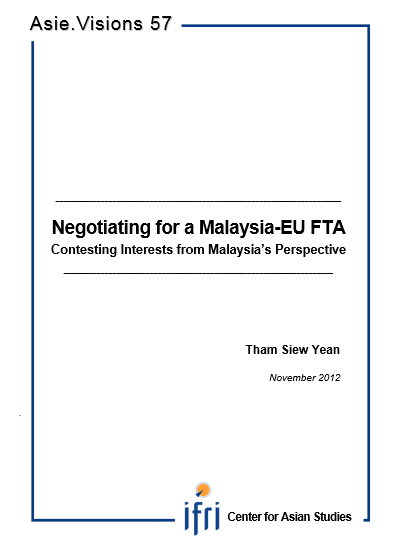Negotiating for a Malaysia-EU FTA: Contesting Interests from Malaysia's Perspective

Malaysia has shifted its focus from multilateral and regional to bilateral trade agreements due to the current doldrums in the Doha Round and the bandwagon effect from similar shifts in other countries.
Despite the importance of trade to the country, negotiations on free-trade agreements (FTAs), especially with developed countries, are fraught with difficulties. Malaysia is still a developing country; its developmental needs may conflict with the requirements of reciprocal market access. Furthermore, FTA negotiations with developed countries generally aim to achieve WTO-Plus commitments that may encounter domestic resistance from different segments of Malaysian society.
The objective of this paper is to analyze the contesting interests of different economic groups such as producers (including government-linked companies), consumers and other social groups in the ongoing FTA negotiations with the EU. The findings in this paper indicate that, in this proposed FTA, there are strong contestations within key offensive and defensive interests of Malaysia. Resolving these contestations requires a clear mandate from the government on the importance and priority of this FTA to the country, relative to other agreements.

Available in:
ISBN / ISSN
Share
Download the full analysis
This page contains only a summary of our work. If you would like to have access to all the information from our research on the subject, you can download the full version in PDF format.
Negotiating for a Malaysia-EU FTA: Contesting Interests from Malaysia's Perspective
Related centers and programs
Discover our other research centers and programsFind out more
Discover all our analyses
RAMSES 2024. A World to Be Remade
For its 42nd edition, RAMSES 2024 identifies three major challenges for 2024.

France and the Philippines should anchor their maritime partnership
With shared interests in promoting international law and sustainable development, France and the Philippines should strengthen their maritime cooperation in the Indo-Pacific. Through bilateral agreements, expanded joint exercises and the exchange of best practices, both nations can enhance maritime domain awareness, counter security threats and develop blue economy initiatives. This deeper collaboration would reinforce stability and environmental stewardship across the region.

The China-led AIIB, a geopolitical tool?
The establishment of the Asian Infrastructure Investment Bank (AIIB) in 2016, on a Chinese initiative, constituted an attempt to bridge the gap in infrastructure financing in Asia. However, it was also perceived in the West as a potential vehicle for China’s geostrategic agendas, fueling the suspicion that the institution might compete rather than align with existing multilateral development banks (MDBs) and impose its own standards.
Jammu and Kashmir in the Aftermath of August 2019
The abrogation of Article 370, which granted special status to the state of Jammu and Kashmir (J&K), has been on the agenda of the Bharatiya Janata Party (BJP) for many decades.







